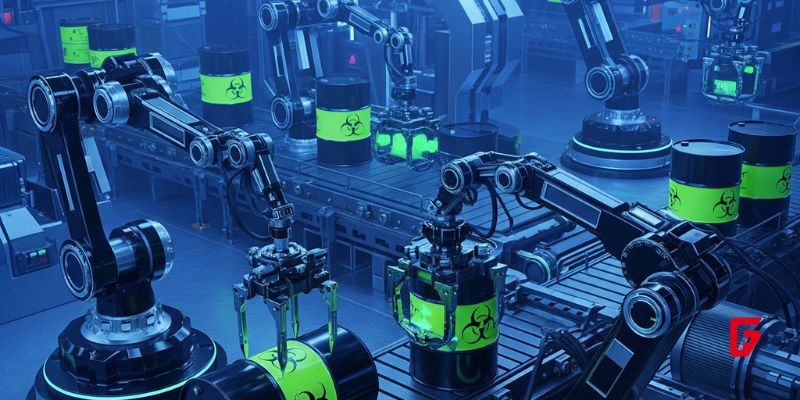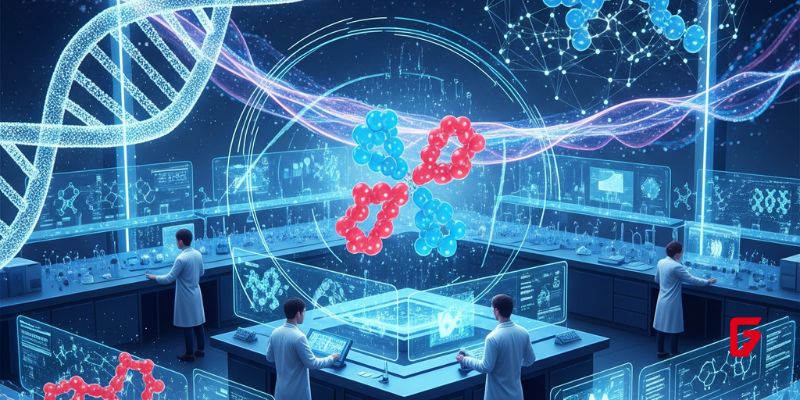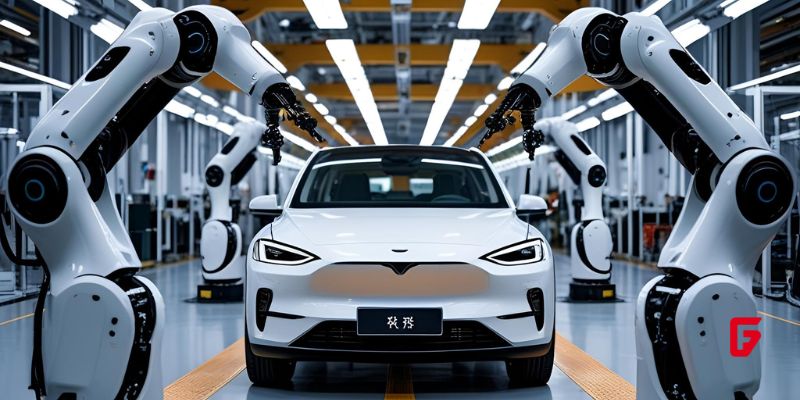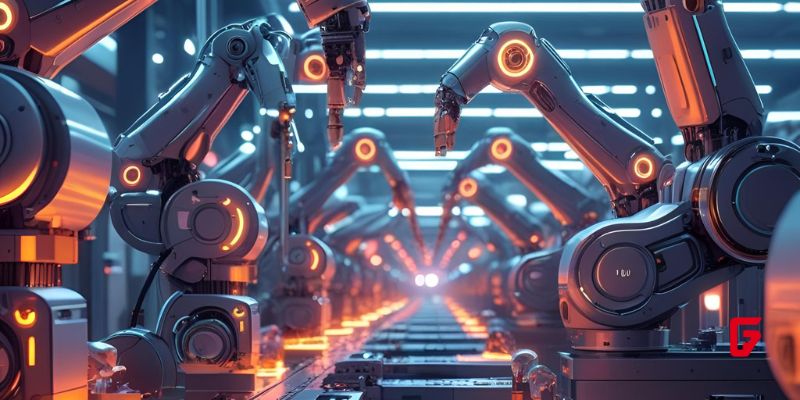
By futureTEKnow | Editorial Team
In an age of rapid technological advancement, the agriculture industry stands at the forefront of a digital transformation that promises to redefine the way we cultivate, harvest, and manage our food sources. Gone are the days of purely manual labor; instead, we are witnessing the rise of sophisticated robotics and automation technologies that are reshaping the very landscape of modern farming.
Robots, once relegated to the realm of science fiction, are now thriving in the fertile fields of agriculture. These machines are not mere novelties but powerful tools that are ushering in a new era of efficiency, sustainability, and productivity in agriculture. From the precision planting of seeds to the delicate task of harvesting fruits, from managing weeds to monitoring crop health, these robots are accomplishing tasks that were once considered impossible for machines.
Robots, once relegated to the realm of science fiction, are now thriving in the fertile fields of agriculture. These machines are not mere novelties but powerful tools that are ushering in a new era of efficiency, sustainability, and productivity in agriculture. From the precision planting of seeds to the delicate task of harvesting fruits, from managing weeds to monitoring crop health, these robots are accomplishing tasks that were once considered impossible for machines.
The adoption of robotics in agriculture is no longer a futuristic concept but a tangible reality. Across the globe, farmers and agricultural professionals are increasingly turning to robots to enhance their efficiency, reduce labor costs, and improve the sustainability of farming practices.
This seismic shift in agriculture is driven by several key factors:
Traditional farming often relies heavily on manual labor, which can be both physically demanding and subject to seasonal labor shortages. Robots are stepping in to fill these gaps, ensuring that essential tasks can be completed regardless of labor availability.
Modern farming demands precision at every stage, from planting to harvesting. Robots excel in precision tasks, ensuring that crops are planted at the optimal depth, spacing, and timing, resulting in higher yields and better resource utilization.
Automation in agriculture allows for the precise application of fertilizers, pesticides, and herbicides, reducing the overall use of these chemicals and minimizing environmental harm. Robotic weeders, for example, can target individual weeds, reducing the need for broad-spectrum herbicides.
Agricultural robots are equipped with advanced sensors and cameras that collect vast amounts of data on crop health, soil conditions, and weather patterns. This data helps farmers make informed decisions about irrigation, fertilization, and pest control, ultimately improving crop yields and resource efficiency.
For large-scale commercial farming operations, robotics can offer scalability that manual labor cannot match. Machines can work tirelessly around the clock, ensuring that no acre of land is left untended.
Some agricultural tasks, such as handling dangerous chemicals or working in extreme weather conditions, pose risks to human workers. Robots can undertake these hazardous tasks, reducing the risk of accidents and injuries.
Robots are programmed to perform tasks consistently and accurately. This reliability is crucial for tasks like fruit and vegetable harvesting, where delicate handling is required to maintain product quality.
Unlike human workers who have limited work hours, robots can operate 24/7, maximizing productivity and reducing downtime.
Robots are being employed in agriculture to address various challenges and improve productivity, but these 3 areas have the most impact:
Robots equipped with advanced sensors and cameras are employed to monitor and manage crops with precision. They can collect data on soil conditions, moisture levels, temperature, and crop health. Drones, for instance, are used for aerial imaging, allowing farmers to identify areas of stress or disease within a field. This data helps farmers make informed decisions about irrigation, fertilization, and pest control, optimizing resource utilization and reducing waste. Precision farming robots can also be equipped with tools for planting, weeding, and harvesting crops with high accuracy, minimizing human labor, and improving overall crop yields.
Autonomous tractors and machinery have become increasingly popular in agriculture. These robots can perform various tasks, such as plowing, seeding, and harvesting, without human intervention. They rely on GPS technology and advanced navigation systems to follow pre-programmed routes or adapt to field conditions in real time. Autonomous machinery can work around the clock, improving efficiency and reducing the need for human labor during labor-intensive farming operations. This technology also enhances safety by reducing the risk of accidents caused by human fatigue or error.
Robots are also making inroads in livestock farming by enhancing the management and monitoring of animals. Robotic systems can automatically feed, milk, and monitor the health of livestock. For example, robotic milking machines can milk cows at optimal times, ensuring consistent milk production and reducing the physical strain on dairy farmers. These robots collect data on individual animal performance, such as milk yield and health indicators, allowing farmers to identify and address issues promptly. Additionally, drones and autonomous vehicles can be used to monitor the movement and condition of herds in extensive grazing systems, improving overall animal welfare and reducing the labor required for herding.
The agriculture robotics market has witnessed exponential growth in recent years, fueled by the pressing need for increased agricultural productivity, sustainability, and the demand for innovative solutions to address the challenges faced by the global farming industry.
The market size of agricultural robots worldwide stood at US$ 7.6 Billion in 2022 and is projected to attain US$ 21.1 Billion by 2028, demonstrating a compound annual growth rate (CAGR) of 18.42% from 2023 to 2028.
Here are some key insights into this rapidly expanding market:
Several factors are driving the growth of the agriculture robotics market. These include the increasing global population, which places greater pressure on agriculture to produce more food; labor shortages in the agriculture sector; the need to reduce the environmental impact of farming practices; and advancements in robotics and automation technologies.
The market encompasses a wide range of robotics solutions, each designed to address specific agricultural tasks. These include autonomous tractors, robotic harvesters, weeding robots, drones for aerial surveillance, robotic milkers, and even swarm robotics systems for precision farming.
The adoption of agriculture robotics is not limited to one region; it is a global phenomenon. North America, Europe, and Asia-Pacific are the major regions where significant investments and deployments are taking place, with North America leading in terms of market share.
Agriculture robots are used across various farming sectors, including precision crop farming, livestock management, dairy farming, and aquaculture. They are employed in activities such as planting, weeding, harvesting, sorting, packing, monitoring, and data analysis.
Sustainable agriculture practices are becoming increasingly important, and robotics plays a crucial role in achieving these goals. Robots enable the precision application of resources like water, fertilizers, and pesticides, reducing waste and environmental impact.
Robotics companies are transforming modern agriculture with innovative solutions that address key challenges in the industry. These advanced technologies are enhancing productivity, reducing labor costs, and promoting sustainable farming practices.
From precision planting and targeted pest control to data-driven crop management, agricultural robots are helping farmers maximize yields while minimizing resource use.
Founded in 2018, futureTEKnow is a global database dedicated to capturing the world’s most innovative companies utilizing emerging technologies across five key sectors: Artificial Intelligence (AI), immersive technologies (MR, AR, VR), blockchain, robotics, and the space industry. Initially launched as a social media platform to share technology news, futureTEKnow quickly evolved into a comprehensive resource hub, spotlighting the latest advancements and groundbreaking startups shaping the future of tech.

Autonomous robots are transforming radioactive waste management by using AI and automation to improve safety, accuracy, and efficiency in hazardous environments.

Mattel’s collaboration with OpenAI signals a new era for toys—combining generative AI with classic play to deliver interactive, adaptive, and personalized experiences.

ForSight Robotics has raised $125 million to develop Oryom, its AI-powered robotic platform for cataract surgery, aiming to revolutionize eye care with precision and accessibility.

Chai-2 by Chai Discovery sets a new standard in biotech, using AI to achieve a 20% hit rate in antibody design. Learn how this breakthrough is changing drug discovery.

Grammarly’s acquisition of Superhuman marks a major shift in AI productivity tools, combining advanced email features with Grammarly’s expanding AI platform.

Meta and Oakley have joined forces to launch the Oakley Meta HSTN AR smart glasses, combining sportswear design with Meta’s AI tech. Learn about features, use cases, and why this launch matters for the future of wearable tech.

Edward Burtynsky’s new photo series captures the dramatic shift to automation in China’s EV factories, highlighting robotics and the changing face of global manufacturing.

X is testing AI chatbots for Community Notes, combining human review and AI to scale fact-checking. Learn how this shapes the future of trustworthy online content.

Amazon is testing humanoid robots to speed up deliveries and automate logistics. Explore how AI-powered robots will change the future of package delivery.

Songscription’s new AI platform transforms audio files into accurate sheet music in minutes, streamlining music transcription for musicians, teachers, and creators.

Apptronik unveils Elevate Robotics, a new venture dedicated to non-humanoid industrial automation robots, leveraging expertise from its Apollo humanoid project to transform heavy-duty industrial tasks.

Cursor’s latest web app empowers developers to manage AI coding agents directly from their browser, streamlining coding workflows and team collaboration.
futureTEKnow is focused on identifying and promoting creators, disruptors and innovators, and serving as a vital resource for those interested in the latest advancements in technology.
© 2025 All Rights Reserved.
To provide the best experiences, we use technologies like cookies to store and/or access device information. Consenting to these technologies will allow us to process data such as browsing behavior or unique IDs on this site. Thanks for visiting futureTEKnow.